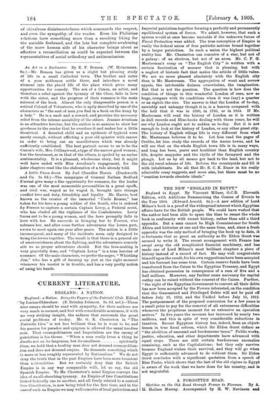England: a Nation. Being the Papers of the Patriots' Club.
Edited t"by Lucian Oldershaw. (R. Brimley Johnson. 3s. 6d. net.)—These nine essays should be read with sympathy, for their authors are 'very much in earnest, and feel with considerable acuteness, if with no very striking insight, the sadness that surrounds the great social problems of to-day. Mr. G. K. Chesterton in " The Patriotic Idea" is not less brilliant than he is wont to be, and his passion for paradox and epigram is allowed the usual too-free ,rein. That cosmopolitanism and Imperialism are the enemy of ,patriotism is his theme. "When a man really loves a thing he .dwells not on its largeness, but its smallness spiritually .then, we hold that a healthy man does not demand cosmopolitan- ism and does not demand empire. He demands something which -is more or less roughly represented by Nationalism." We do not .deny the truth that in the past Empires have been more transient than nationalities. But we certainly deny that the British Empire is in any way comparable with, let us say, the old Spanish Empire. To Mr. Chesterton's mind Empire conveys the idea of an all-absorbing tyranny. An Empire of free Constitutions 'linked federally one to another, and all freely related to a central 'free Constitution, is now being tried for the first time, and in the
• .case of such an Empire we may well conceive of local patriotism and
Imperial patriotism together forming a perfectly and permanently equilibrated system of forces. We admit, however, that such a system would at once become unstable if the unknown forces of Fiscal Protection were added.. The true conception of Empire is really the federal union of free patriotic nations bound together by a larger patriotism. In such a union the highest political reality lies. Mr. Chesterton can conceive of a star, but not of a galaxy : of an electron, but not of an atom. Mr. C. F. G. Masterman's essay on "The English City" is written with a certain fascination of manner that is pleasing, but with a neglect of historic fact that makes the article of little value. We are no more pleased absolutely with the English city' than is Mr. Masterman. The aggregation of want and sorrow appals, the intolerable dulness overwhelms, the imagination. But that is not the question. The question is how does the condition of things in this wonderful London of ours, now so huge, compare with its conditions when it was (say) a quarter or an eighth the size. The answer is that the London of to-day, unwieldy and unhappy though it is, is a heaven compared with the hell that it was in 1690, in 1785, or in 1834. If Mr. Masterman will read the history of London as it is written in dull records and Blue-books dealing with those years, he will see why London ought not to sadden us to-day. But it is not enough to look at the history of London, or any other great city. The history of English village life is very different from what Mr. Masterman believes it to be. Let him read the pages of Crabbe, let him study the records of the Assize towns, and he will see that on the whole English town life is in many ways, and long has been, purer and healthier than English country life, despite maypoles and the idylls of the farmyard and the plough. Let us by all means get back to the land, but not to the old rural scheme of life. Reform the countryside and fill it with inhabitants. Do all that Mr. R. C. K. Ensor in his really admirable essay suggests, and more also, but there must be no "reaction towards obsolete ideals."










































 Previous page
Previous page